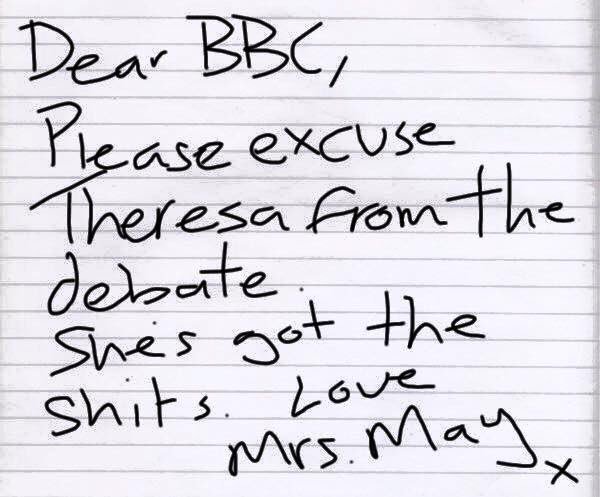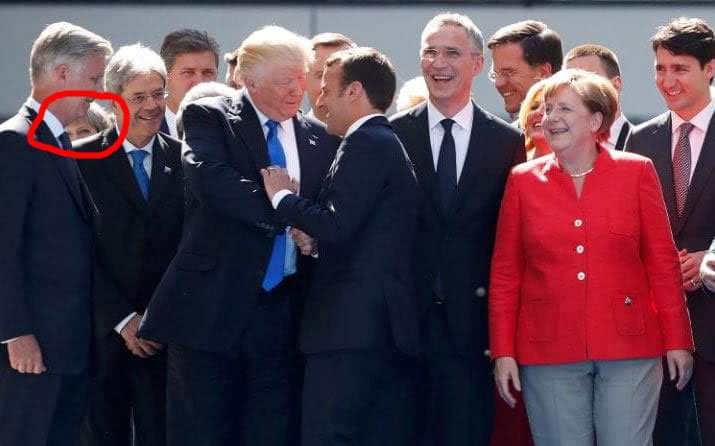A note has just turned up better late than never, well maybe not :lol:





More like she got wind that the BBC would rig the audience with marxists
Given the bias against Corbyn from the BBC (and pretty much all of the mass media) that might bring some much-needed balance. Not that it happened, of course, other than in the paranoid minds of the right.
Given the bias against Corbyn from the BBC (and pretty much all of the mass media) that might bring some much-needed balance. Not that it happened, of course, other than in the paranoid minds of the right.















Did you watch it?
They were even jeering the presenter when she asked Corbyn vaguely pressing questions. Whooping and wailing whenever their great leader opened his mouth, it was pathetic.
Talking about paranoia, pot and kettle comer to mind
And you believe that? LolFirst: the audience was chosen by an independent polling panel, not the BBC
Second: they made sure than no one who was active in any campaign since 2104 was involved.
Third: the audience was chosen representative of the parties, roughly equal amounts of tory/Labour and pro rata for the smaller parties.
Fourth: They also ensured that the audience was equally split between remain and leavers.
in total you could not really get a more representative audience. Their laughter, applause and booing were spontaneous and if you work it out with 7 parties 5 would be leftish and 2 ( tory and UKIP) right wing.
This was not rigging, it's what you get when aPM does not turn up and a stooge is sent to answer for their record so far and teh non existant promises, most people their just could not believe it.
The BEEB were innocent , full stop! ( Except for the nonentity that failed to control the debate that is!)
First: the audience was chosen by an independent polling panel, not the BBC
Second: they made sure than no one who was active in any campaign since 2104 was involved.
Third: the audience was chosen representative of the parties, roughly equal amounts of tory/Labour and pro rata for the smaller parties.
Fourth: They also ensured that the audience was equally split between remain and leavers.
in total you could not really get a more representative audience. Their laughter, applause and booing were spontaneous and if you work it out with 7 parties 5 would be leftish and 2 ( tory and UKIP) right wing.
This was not rigging, it's what you get when aPM does not turn up and a stooge is sent to answer for their record so far and teh non existant promises, most people their just could not believe it.
The BEEB were innocent , full stop! ( Except for the nonentity that failed to control the debate that is!)
Now you've blown it you've introduced facts into the conversation :lol:
.
Facts over conspiracy theories every time!
It's much more convenient like Trump, to think the press are after you when in reality the truth is the audience just did not like what they heard and did not see ( Mrs may)
Mr Hawkins said the audience response was "a reflection of the fact that the Conservatives were on the back foot because Theresa May didn't turn up - and therefore it's a bit of an easy target".
One thing that is standing out to me is one of Mrs May favorite soundbites is we need a strong leader but the more the campaign goes one the more I see her as a weak leader. Not just last nights no show but the constant u-turns, all the answers to interview questions are deflected with party soundbites most of which are just attacks of the opposition. I am not a natural supporter of Corbyn but I do feel at least he is showing people what they will get instead of giving out a load of bollocks that will be altered if elected. I don't think he will win but I also don't think she will get the landslide she was expecting.
Gavin Jamesonââ¬Â @GavJam5 May 31
The last I saw of her was when she was using her strong hand in Europe #wherestheresa

Jimmy Crankie making the same play for labour coalition..
IMO Corbyn needs to show some spine and make it clear right away no deal.. otherwise I think a repeat of 2015 is on.
The biggest problem with that is labour have only a very small chance ( if at all) of a majority so will have to depend on support from the other leftist parties, they share many policies with SNP. Once you say No Deal then there will be no support, it's cutting off your nose to spite your face!
If there had been no audience she still wouldn't have turned up, she called an election that was never needed and that she said would not happen because she was sure she was going to have a landslide victory then came the U turns and to be honest i am not surprised she didn't want to face her opponents they would have made mincemeat out of here audience or no audience..
Number 6 is my favourite - 6. Early election: ââ¬ÅThere isnââ¬â¢t going to be one. It isnââ¬â¢t going to happen. There is not going to be a general election,ââ¬Â Mrs Mayââ¬â¢s spokesman said in March. A month later, with the Tory poll lead in double figures, she announced that she had ââ¬Åreluctantlyââ¬Â decided a vote was necessary to strengthen her hand before Brexit negotiations.
Theresa Mayââ¬â¢s 9 U-turns
For a prime minister who has promised to offer strong and stable leadership, Theresa May has a record of rapid U-turns.
Here are the big policy shifts during the past 12 months:
1. Brexit: Mrs May was not a vocal Remainer but she was a firm one, saying in April 2016 that ââ¬Åon balance, and given the tests I set earlier in my speech, I believe the case to remain a member of the European Union is strongââ¬Â.
A week after the vote she spun on her heels, launching her leadership campaign with the words ââ¬ÅBrexit means Brexitââ¬Â.
2. A British bill of rights: During the referendum campaign, Mrs May advocated leaving the European Convention of Human Rights, whose rules on the use of evidence gained by torture had frustrated her as home secretary. The convention, she said, ââ¬Åcan bind the hands of parliament, adds nothing to our prosperity, [and] makes us less secureââ¬Â. She called instead for a British bill of rights.
But, bidding for the Conservative leadership, she made clear that she had changed her mind. Her 2017 Conservative manifesto also says Britain will remain a signatory of the ECHR ââ¬Åfor the duration of the next parliamentââ¬Â.
3. Hinkley Point: Almost the prime ministerââ¬â¢s first significant decision was to review plans to allow an �ã18bn new nuclear reactor backed by French and Chinese companies. That reflected concerns about Chinaââ¬â¢s influence over Britainââ¬â¢s power supply and caused a rift in relations with Beijing. But in September, Downing Street said it had completed the review and the go-ahead, with only minor restrictions on Franceââ¬â¢s EDF selling its stake during construction.
4. Workers on boards: In September, she promised to ensure ââ¬Ånot just consumers [are] represented on company boards, but workers as wellââ¬Â. That was interpreted as meaning trade union representatives on boards, a prospect opposed by cabinet ministers including chancellor Philip Hammond.
The Conservative manifesto described a weaker policy: ââ¬Ålisted companies will be required either to nominate a director from the workforce, create a formal employee advisory council or assign specific responsibility for employee representation to a designated non-executive directorââ¬Â.
5. National insurance: Mr Hammondââ¬â¢s budget in March announced that self-employed workers would pay higher national insurance contributions, breaching a promise in the 2015 Conservative manifesto not to increase the tax. The change would have raised an estimated �ã500m a year, but the headlines were terrible. Mrs May pulled the plug and a U-turn was announced a week later.
6. Early election: ââ¬ÅThere isnââ¬â¢t going to be one. It isnââ¬â¢t going to happen. There is not going to be a general election,ââ¬Â Mrs Mayââ¬â¢s spokesman said in March. A month later, with the Tory poll lead in double figures, she announced that she had ââ¬Åreluctantlyââ¬Â decided a vote was necessary to strengthen her hand before Brexit negotiations.
7. Energy price caps: Ed Milibandââ¬â¢s promise to freeze energy prices appeared to have been resurrected by Mrs May. ââ¬ÅMinisters are poised to unveil a cap on energy prices,ââ¬Â reported the Daily Mail newspaper, days before the Conservative manifesto launch.
But the actual manifesto promise turned out to be less radical: ââ¬Åan independent reviewââ¬â°.ââ¬â°.ââ¬â°.ââ¬â°to make recommendations as to how we can ensure UK energy costs are as low as possible, while ensuring a reliable supply and allowing us to meet our 2050 carbon reduction objective. Our ambition is that the UK should have the lowest energy costs in Europe, both for households and businesses.ââ¬Â
8. Social care: On Thursday, the Conservative manifesto was clear: rich people requiring care in their homes would be obliged to pay for it, unless they had less than �ã100,000 in assets including the family home. The move soon became labelled a ââ¬Ådementia taxââ¬Â. On Sunday, Boris Johnson said he understood criticsââ¬â¢ concerns. On Monday, Mrs May announced that care payments would be capped.
9. Foreign worker lists: There was consternation among business in October when Amber Rudd, home secretary, suggested that companies would have to publish figures on their number of foreign workers. The precise wording was that companies would have to ââ¬Åbe clear about the proportion of their workforce which is internationalââ¬Â. The UK Independence party branded the plans a ââ¬Åstep too farââ¬Â. The government later said no data would be made public.
Financial times.
.
Enter your email address to join: